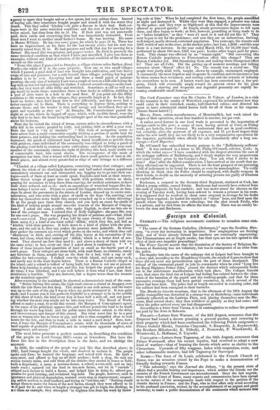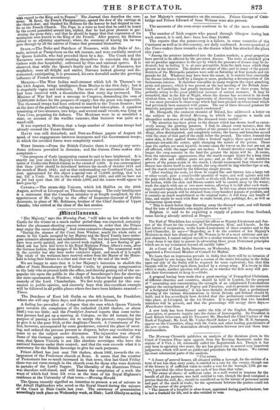goreign anti (Colonial.
GERMANY.—The religious movements continue to occasion some rest- lessness.
" The cause of the German Catholics, (Reformers,)" says the Swabian Mer- cury, "is every day increasing in importance. New congregations are forming daily, and of those already formed the numbers are continually augmenting. The Ultramontanes are at length awake; but their eyes are too late opened to the effect of their own impolitic proceedings." The Weser Gazette asserts that the dissolution of the Society of Religious Re- formers at Konisberg was not voluntary, but was in consequence of an order from the police. The inquiry into the cause of the unhappy riot at Leipzie had been brought to a close; and, according to the Magdeburg Gazette, the result of it goes to show that there did not exist any premeditation upon the part of those inculpated. The refusal of the communal guard to join its commander when he cried "Long live his Royal Highness Prince John," caused the distrust which subsequently broke out in the unfortunate manifestation which took place. The Cologne Gazette says, that since the fatal riot at Leipzic bad feeling has existed between the chas- seurs of the battalion of the guard and the working-people, and that for three successive evenings there had been partial rencontres, which several of the latter had been hurt. The police had at length succeeded in restoring order, and the soldiers had been consigned to their barracks.
The Manheim Gazette mentions, that in the afternoon of the 29th August the public tranquillity was disturbed in a strange way at Heidelberg: some individuals suddenly collected on the Ludwigs Platz, and, placing themselves near the Mu- seum, fired several shots; they then withdrew as quickly as they had come; and when the police arrived every one had disappeared. According to a letter from Vienna, it is in contemplation to reduce the personal tax paid by the Jews in Bohemia.
Potaim.--Letters from Warsaw, of the 22d August, announce that the Emperor had issued a decree granting a general pardon, and restoring to their property which had been confiscated the following Polish emigrants— Prince Gabriel Mirski, Stanislas Chaynaki, S. Kasperski, A. Koyanowskl, the Brothers Mikalowski, K. Nidecki, J. Protowski, P. Winekierski, Z. Wisniewski, L. Hoffmani, Z. Uzynski.
Caucasus.—Letters from Taganrog, of the 10th August, announce that Prince Woronzoff, after his recent repulse, had resolved to adopt a new kind of warfare—that of burning the forests which serve as shelter to the Circassians. Upwards of fifty waggons, laden with turpentine, resin, and other inflammable matters, had left Taganrog for Stavropol.
ROME.—The feast of St. Louis, celebrated in the French Church at Rome, was an occasion seized by the Pope to make a demonstration of friendly feeling towards France.
" This solemnity," says the Journal des Debats, "in the present state of affairs had a peculiar bearing and importance, which neither the friends nor the enemies of the French Government can misunderstand. Since the last negotia- tions with the Court of Rome, many reports and commentaries have been spread as to the nature of the arrangements made with respect to the position of the Jesuits Society in France; and the Pope, who in that affair only acted according to his profound conviction, wished, by the accomplishment of an august and pions ceremony, to make a public demonstration of the sentiments which animate him *s regard to the Nina and to Franca" The Journal then describes the cere- mony. M. Rossi, the French Plenipotentiary, opened the door of the carriage at the church-door' and thanked his Holiness for the honour he had deigned to con- fer on the French Church. The Pope, in a voice so loud that he could be heard by the crowd assembled around him, replied, that be had great pleasure in per- orming the pions duty; and that he should be happy that that expression of his sentiments were known to the King of the French. After prayers, his Holiness retired to an adjoining apartment; where the ceremony of kissing his toe was gone through by all the natives of France that presented themselves.
Sra.m.—The Duke and Dutchess of Nemours, with the Duke of Au- male, arrived at Pampeluna on the 4th instant; and were cordially received by Queen Isabella, who had preceded them by a day. The Court and the Navarrese were strenuously exerting themselves to entertain the Royal visitors with due hospitality, enlivened by fetes and national sports. It is observed, that while the Queen's family and the Duke of Rianzares, her stepfather, were all delight and smiles, Narvaez looked gloomy and dis- contented; anticipating, it is presumed, his own downfall under the growing influence of French ascendancy.
MEXICO.—The West Indian mail-steamer which left St. Thomas's on the 14th August, brings intelligence from Mexico to the 31st July; but it is singularly vague and indecisive. The news of the annexation of Texas had been received with a dissatisfaction that every day increased. The Minister of War had sent a message to Congress, demanding the sum of 15,000,000 dollars for the purposes of supply; but the grant was impossible. Ten thousand troops had been ordered to march to the Texan frontier; but at the date of the packet's sailing no movement had taken place. A squadron consisting of two steamers, two brigs, and several small vessels, was lying at Vera Cruz, preparing for defence. The Mexicans were in so unsettled a state, on account of the warlike rumours, that business was quite at a stand-still.
It was reported in Mexico, that a large number of American troops had already crossed the Texan frontier.
HAYTI was still disturbed; and Port-au-Prince papers of August 3d speak of two engagements between insurgents and the Government troops, in which the revolted forces were completely routed.
WEST IsrmEs.—From the British Colonies there is scarcely any news. Some sickness prevailed in Jamaica; and the Guiana Times makes this complaint-
" Oar prospects of Cooly immigration cannot be said to have brightened. It is exactly one year since her Majesty's Government gave its sanction to the impor- tation of Coolies into British Guiana to the extent of 5,000. It was contemplated that those 5,000 should be introduced between the month of October 1844 and the month of March 1845; and on that understanding our Combined Court, last year, appropriated for this object a special vote of 75,0001. sterling, that is to say, 151. a Cooly. We are in the month of August 1845, and still we have not as yet had more than 585 of the whole 5,000, and the season would appear to have gone by."
CaseAra.—The steam-ship Unicorn, which left Halifax on the 28th August, arrived at Liverpool on Thursday morning. The only intelligence is a statement that the Canadian ministry is at length completed, by the appointment of Mr. Cayley to the office of Inspector-General of Public Accounts, in place of Mr. Robinson, brother of the Chief Justice of Upper Canada; who retired at the close of the last session.



























 Previous page
Previous page